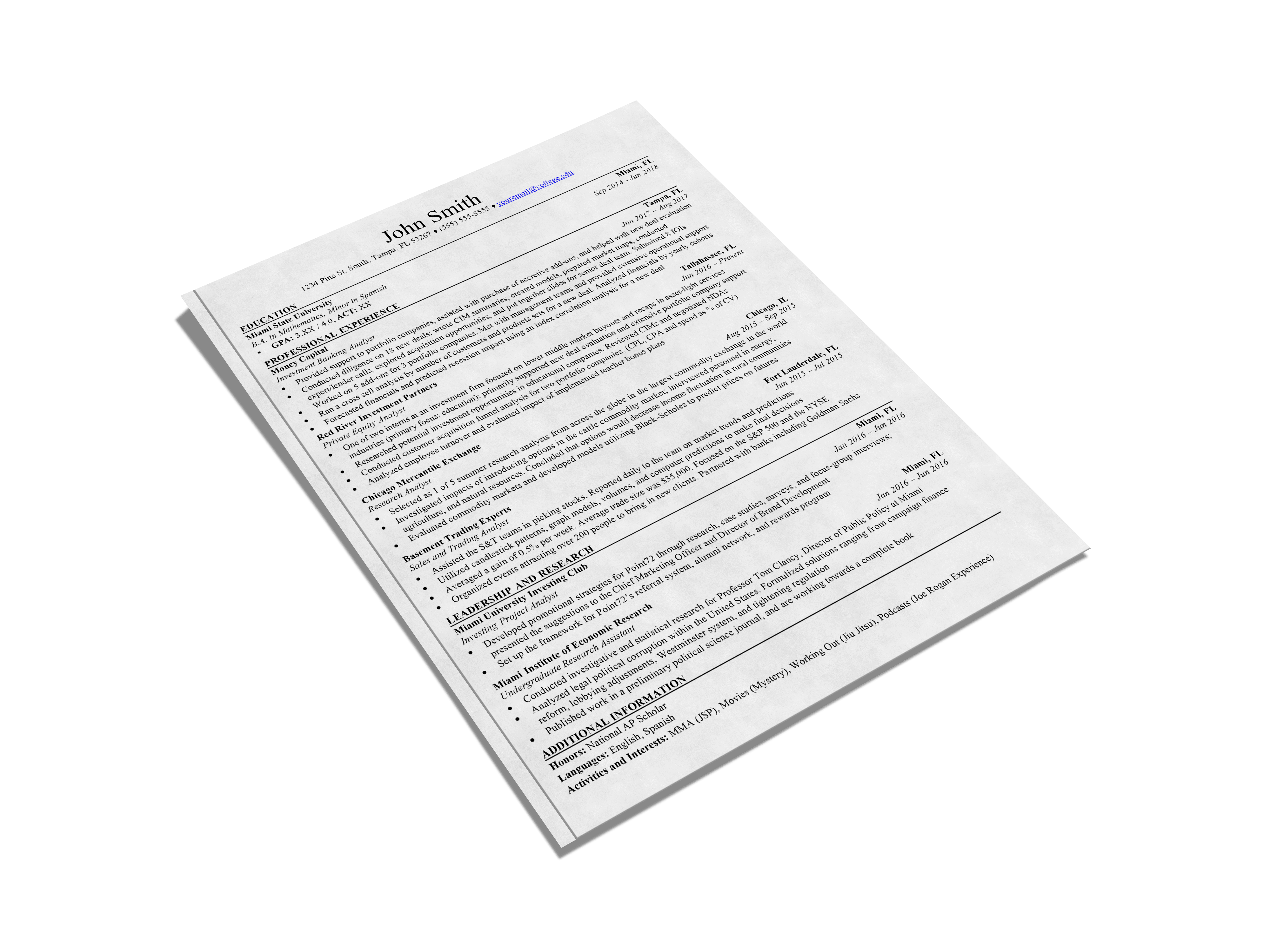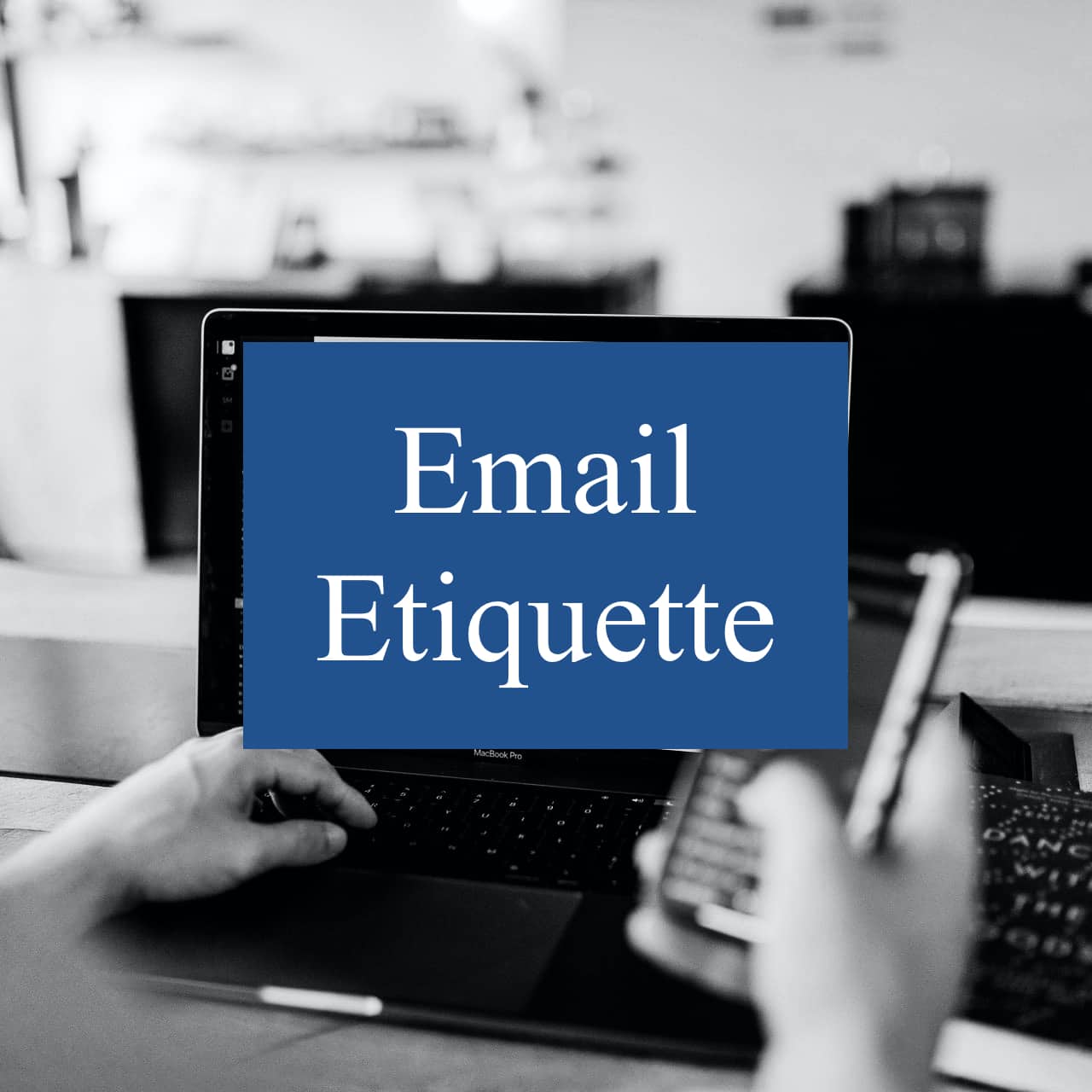Resume
The resume is one of the most important parts of breaking into finance. It is crucial that your resume is clean, succinct, and strong. This is the document that opens the door for you, and people make a judgement within seconds of looking at your resume.
Download the sample resume as a guide on how to build your resume. This is a standard template that is well received across finance. We strongly recommend this format. Click on the picture to download.

Resume Do’s
1. Be Clear And Succinct In Your Wording
Interviewers have very little time to get to know who you are; they want to understand what you have achieved very quickly. Brevity is your friend. Don’t say something in 10 words when 5 words will suffice. Not only should you be succinct, but make sure you clearly explain what your experience is. Anybody, within seconds of looking at your resume, should understand what your role was and what you have achieved.
2. Add Extracurriculars And Interesting Items
Interviewers want to get a sense of what kind of person you are outside of the office just as much as who you are inside of the office. Include what you do for fun and what extracurriculars you are passionate about. This is usually done at the bottom of the resume. This helps shape a better picture of who you are. Also, be specific with your interests. If you say basketball, put your favorite team in parentheses next to it. For example, an interest could be “Cooking (New York Style Pizza).” Don’t be shy to express who you are.
3. You Must Put Your GPA And SAT/ACT/GMAT Score
If you do not have your GPA on your resume it is likely to get thrown out. Even if you have a 3.0 or lower, put it on your resume. Standardized test scores are not required but are recommended if they reinforce your strengths. It is another opportunity for you to show off your intelligence and ability. If you do not have good SAT or ACT scores, it is okay to put graduate exam scores such as the GMAT or GRE.
4. Quantify Every Achievement And Task
Numbers are extremely memorable and impactful. If somebody sees “Helped increase website traffic by 25%” vs “Helped increase website traffic”, he or she is more likely to be impressed by the first statement. It is an easy way to make your resume standout, and helps validate your claims. Moreover, it makes your resume easier to read for people who are higher up at organizations.
5. Order Your Activities In Chronological Order
Interviewers want to see what you have done most recently at the top of your resume. It is the easiest and quickest way to understand what you have done the last few years and in school. If you have multiple experiences that happened at the same time put the one that is most impactful at the top.
6. Send Your Resume As A PDF And Name It
Always, always, always send your resume as a PDF. Never send it as a word document, a google doc or a dropbox link to download it. If you send a word document or download link, your application is much less likely to be reviewed. When you send your resume, always name it “First Name, Last Name, Resume, Date” e.g. “John Smith Resume 9.1.20.” This is just a clean way of naming your file and helps interviewers keep track of you. The date is important to include as it allows you to easily share an updated resume with new developments without causing confusion.
7. Start Each Bullet With A Verb
The goal of the resume is to understand what you have done and what you have achieved. Start each bullet with a verb to get straight to the point: “Created a website”, “Analyzed a public company”, “Organized business contacts.” There are few exceptions to this rule, particularly when you are describing who you are, for example “Leader of the largest investing group on campus.”
Resume Don’ts
1. Make Spelling Errors
Spelling errors are the quickest way to get your resume discarded. It shows that you lack attention to detail, which is not a good sign when you’re seeking a job that is based on attention to detail.
2. Lie On Your Resume
Lying about anything is a one-way ticket to getting rejected or tarnishing your reputation. Do not under any circumstance lie on your resume or during your interview. Don’t include things you can’t do on your resume, e.g. adding “Made a DCF for Walmart.” If you never did it or don’t know how to, then don’t add it on your resume. This avoids awkward conversations, interview questions that you’re unable to answer, and people discussing your resume or candidacy in a negative light after your interview.
3. Include Irrelevant College Coursework
Nobody needs to know that you took Vector calculus your freshman year. It just provides an opportunity for interviewers to grill you on the classes you took, especially when it’s irrelevant to the job at hand. It also takes up space that can be used for your job experiences or on campus activities. Interviewers care about other information much more than your classes. The interviewer might ask you “What was your favorite class in college?” and that will give you the opportunity to showcase what classes you have taken and what you enjoy.
On the other hand, if you did not major in finance or economics but took classes such as accounting or corporate finance, including these classes on your resume can serve to your benefit.
4. Have A Resume Longer Than A Single Page
Resumes in finance must be 1 page – no more, no less. We have seen interviewers rip off extra pages on a resume and discard them. Other jobs may allow for longer resumes, but this is not the case in finance. You should have enough space to say what you want. If you find yourself going over, you’re likely being verbose or need to improve your formatting and spacing. If you find yourself not filling out the page, you’re likely not adding enough detail.
5. Add Microsoft Office Under Skills
If you are applying to a finance job as a college student, chances are you really don’t know how to use excel or powerpoint at an advanced level. Don’t put this on your resume if you are unable to back it up with knowledge and examples of projects where you’ve had to use them at an advanced level. We have seen interviewers ask “What is your favorite excel function?”, if you fumble on that question or give a weak response it is not a good look.
6. Have Too Much White Space
Leaving too much white space on your resume means you missed an opportunity to showcase your accomplishments or highlight what you have done. Put your margins on narrow and fill each and every line. Don’t be wordy, just fill your resume with meaty substance.



